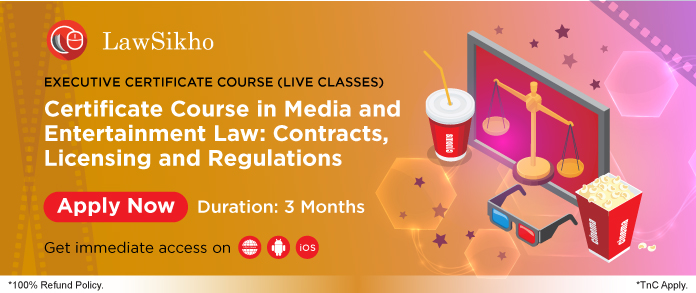This article is written by Devina Poonia, from Ansal University, Gurugram. The author explains the rights and protection of scriptwriters in context regarding the Indian Law. This article is edited by Ilashri Gaur, a law student pursuing B.A. LLB (Hons.) from Teerthanker Mahaveer University (CLLS).
Table of Contents
Introduction
Writing a script for a movie or a show that is to be telecasted? One thing to know is that being a scriptwriter requires creativity of the mind, bringing life in the characters, and with that comes heavy responsibility to protect your work from being copyrighted. The screenplay must be protected from infringement so that the real owner of a script can get copyright over his work. It is always advisable to register your scripts before circulating it to the actors/producers or to be published in a book as there are many infringers who are ready to plagiarize the work of the original author and claim it as his own. There are many laws in India protecting the rights of screenplay writers.
Who are scriptwriters
A screenplay writer or a scriptwriter is an individual who writes the script for screenplays or movies or Tv shows which is to be telecasted. They practice the craft of screenwriting by writing plays/plots/storylines for entertainment industries that are produced in bulk and get approved by mass media houses or production houses.
There is also a huge difference between a “writer” and a “screenwriter”, a writer is the one who writes the main plot of the story, the facts on which the movie or a series would be based on whereas a screenwriter is the one who writes the dialogues for the characters or works on a screenplay.
Meaning of “author” under the Copyright Act 1957
Under Section 2 (d) Interpretation clause the definition of the author is:
- in relation to a literary or dramatic work, the author of the work;
- in relation to a musical work, the composer;
- in relation to an artistic work other than a photograph, the artist;
- in relation to the photograph, the person taking the photograph;
- in relation to a cinematograph film or sound recording, the producer; and
- in relation to any literary, dramatic, musical, or artistic work which is computer-generated, the who causes the work to be created.
Protection under Copyrights Act of 1957
Copyrights were not adopted for many years by India but it became a signatory to International Copyright Order 1991. Copyright is an intellectual property right which protects the rights of writers, it is important to understand the need of copyright as it became a hurdle in previous times as authors work was no more original and there were a lot of copyright issues, hence the need to adopt copyright became necessary.
The copyright protection protects the rights and provides economic benefits to the real and original author to prevent their data from prevention, display, and generation of work. Section 17 of the Copyright Act 1957 explains the First Owner of Copyright, “an author under the employment of proprietor whose work is meant to be published in any newspaper, publication, magazine or similar periodical in the absence of a contract, is the first owner of the copyright in the work”.
If a work is being copied an individual must gain the consent of the real owner first and pay a certain amount of fees, there many economic benefits given to the first owner. Here are some benefits:
Economic rights
Under Section 14 of the Act, the copyright subsists in literary, dramatic, musical, and other artistic works; they enjoy the economic right provided by this section:
- in the case of a literary, dramatic or musical work, not being a computer programme—
- To reproduce the work in any material form including the storing of it in any medium by electronic means;
- To issue copies of the work to the public not being copies already in circulation;
- To perform the work in public, or communicate it to the public;
- To make any cinematograph film or sound recording in respect of the work;
- To make any cinematograph film or sound recording in respect of the work.
- In the case of any computer programme-
- Any of the acts specified in clause (a);
- To sell or give on commercial rental or offer for sale or for commercial rental any copy of the computer programme.
Moral rights
India has adopted the Berne Convention and Article 6 bis(1) states that “Independently of the author’s economic rights, and even after the transfer of said rights, the author shall have the right to claim authorship of the work and to object to any distortion, mutilation or other modification of, or other derogatory action in relation to, the said work, which would be prejudicial to his honour or reputation”.
Section 57 of the Act, talks about the Author’s Special Rights which is the right to paternity and right to integrity. The right to paternity refers to the right of an author to claim authorship of work and prevent all others from claiming his work. Right to integrity empowers the author to prevent distortion, mutilation, modification or other act in relation to the said work, if such distortion, mutilation, modification or other act would be prejudicial to his honour or reputation: Provided that the author shall not have any right to restrain or claim damages in respect of any adaptation of a computer programme to which clause (aa) of sub-section (1) of Section 52 applies.
Unlike economic rights which subsists after the death of the author, moral rights remain intact even after death as it signifies the soul and creativity of the author and these rights can never be claimed by any other author. These rights are not assigned, sold, and transferred, the moral rights remain for 70 years after the first date from the publication but the right to integrity expires on the death of the author.
Other than this Section 58 of the Copyright Act, which explains the Right of Owner against persons possessing or dealing with infringing copies, individuals possessing copies of work of the original author with the intent to use infringing copies, is deemed to be the copyright of the owner, and the owner can take the necessary action against the infringer in the court of law for the recovery of possession.
- If the opponent proves he was not aware of and had no reasonable ground to believe that copyright subsisted in the work of which such copies are alleged to be infringing copies; or
- He had reasonable grounds for believing that such copies or plates do not involve infringement of the copyright in any work.
Is copyright registration necessary
It is better if an author registers his script with the registrar of copyrights office and for registering scripts of films it can be registered with Films Writer Association, so before distributing his work to producers or actors as the idea of creativity and the content can be copied by anyone if it is not registered. The entire process takes just 24 hours and the application for registration can be filed online or with the FWA, the whole process costs around INR 2700-3000 which is the fee for registration for copyrights of the script in Appendix A.
Though the registration of the script is not necessary in cases of infringement of the original work if the real owner does not have the certificate of copyright registration which is the prima facie evidence then the author will not be able to claim his rights in the court.
What to do in case of plagiarism of script
If a script or a screenplay is found to be plagiarized then both civil and criminal remedies are available to the owner whichever the case may be.
Civil remedies
These are well explained in Section 52-55 of the Copyright Act, thus an owner is entitled to all such remedies such as injunction, damages on account of profit, and otherwise conferred by the way of law. We are going to discuss civil remedies one by one in the article.
- Injunction: The most famous remedy sought to stop the infringer is to stop continuing the offence through the way of injunctions. The court may order an injunction relief to the plaintiff to stop the defendant from selling or possessing the infringing copies. In most cases, the plaintiff may not even be compensated if the defendant proves that he had a reasonable ground to occupy such copies. If there is no reasonable ground then the defendant needs to compensate the plaintiff for the actual amount paid in part or whole of the actual damages. In the case of Gramophone Co. of India Ltd. v. Mars Recording Pvt. Ltd after complying with Section 52(1)j, the respondent started producing audio cassettes of the musical audio owned by the Gramophone Company. In the face of a threat that the audio cassettes will be seized by the police from the rightful owner, the respondent moved to the High Court to invoke an injunction against the plaintiff and the same was approved by the High Court.
- Damages on accounts of profits: Section 55 provides for damages and accounts relief besides injunction the remedy of injunction can be joined either with that of damages or accounts, but the remedies of accounts and damages can in no case be joined.
Criminal remedy
Chapter xiii of the Copyright Act deals with various criminal offences in case of any infringement of the copies of the owner. Section 63 of the Act explains the Offence of infringement of copyright or other rights conferred by this Act which says that if any person who intentionally abets the offence of copyright in terms of infringement of:
- The copyright in a work;
- Any other right conferred by this act.
Shall be punished with imprisonment of a term which shall not be more than six months but may extend up to three years depending on the circumstance and the criminal liability of the offender with fine which shall not be less than 50,000 but may extend to 2,00,000 rupees.
Film Writers Association (FWA)
This association was formed by screenwriters which is a registered trade union for all the writers and script makers. In 2016 it changed its name to Screenwriter Association (SWA). authors who are looking for opportunities to become scriptwriters can register themselves with FWA to protect their work from infringement. It is headquartered in Mumbai, it is advisable by SWA to at least have a couple of drafts before hooking into any production.
This association lays down many guidelines which can be followed by the young minds and they are-
- Always maintain a copy of the original scripts.
- Negotiate the price with the production house before signing in a deal.
- Do not work without the contract.
- Sign a Non-Disclosure Agreement and insist on recording a meeting.
- Do not plagiarize.
- Do not sell your first drafts to the production houses.
- E-mail the soft copies to producers/actors if they do not insist on hard copies of the script.
Conclusion
The rights of scriptwriters are meant to be protected as they are the creative minds of the entertainment industry and need to be secured from the hands of the infringers. If any screenplay or script is infringed by many authors then there would be no production of the original work and the entertainment industry can see a downfall this is where the Copyright Act comes into play which ensures the protection of their rights and provides them with suitable remedies for future recourse of infringement issues.
Scriptwriters can form associations if they feel that the current organization is not able to secure them. It will give them a sense of security and there will be a union between the writers and also they can discuss their ideas and thoughts with each other so that there is no possible outcome of plagiarism. This will ensure their rights of publication and also they will get a sense of recognition by working together, with this the film associations should also cater to the needs of the writers and treat them equally by paying them wages according to their calibre and skills projected into the production.
References
- https://www.legalraasta.com/blog/rights-author-copyright-law/
- http://docs.manupatra.in/newsline/articles/Upload/1EC850DF-EAA0-4E86-BD9B-99E2B16F12BB.pdf
- http://www.legalserviceindia.com/article/l195-Copyright-Law-in-India.html
- https://www.lawctopus.com/academike/moral-rights-author/
- https://shodhganga.inflibnet.ac.in/bitstream/10603/172481/13/13_chapter%207.pdf
- https://www.swaindia.org/do.php
LawSikho has created a telegram group for exchanging legal knowledge, referrals and various opportunities. You can click on this link and join:
 Serato DJ Crack 2025Serato DJ PRO Crack
Serato DJ Crack 2025Serato DJ PRO Crack











 Allow notifications
Allow notifications


